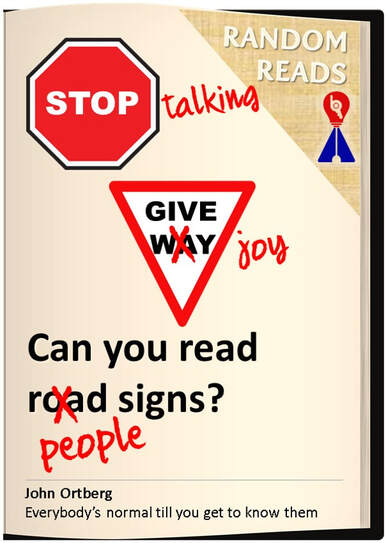|
Road signs seek to remove the guesswork out of what you should be doing behind the wheel. What about people signs? What if we had to get licensed before we could start navigating relationships? People could get pulled over by relationship police for talking too fast or too long or too loud, for failure to come to a complete and thoughtful “stop” before executing a proper confrontation, or for trying to merge when all the signs said, “road closed.” It would be a great help if people had signs telling us how to respond to them as we navigate our relational lives. The truth is, they do. But we have to learn how to read them. Is it “Men At Work” or “Emotions At Work”? Is it “Road Closed” or “Heart Closed”? The most common way people send this signal is with their eyes. Eye contact produces strong emotions; in a normal conversation it rarely lasts more than three seconds before one or both people experience a powerful urge to glance away. In your interactions, look for nonverbal stop signs: People start looking away; they stop giving you little verbal cues that say they’re listening; they lean backwards; they stop interacting and asking questions. Stop talking! Give someone else a chance. When we stop talking, we also have the opportunity to engage in the most important intimacy-building skill in the world: listening. W.H.Auden wrote, “Among those whom I like or admire, I can find no common denominator, but among those whom I love, I can: all of them make me laugh.” More often than you can imagine, when people are stressed, worried, preoccupied, lonely or afraid, they carry this sign just beneath the surface: “Joy needed—please lighten up.” People who don’t take themselves too seriously give a great gift to those around them. In contrast, joy-challenged people face a serious handicap in trying to live in community. One of the hardest things in the world is to be right and not hurt anybody with it. Remember some time in school when you sat next to the smartest kid in class. Did you enjoy it? Being right (or more precisely, having the need to be right) is a terrible burden. In contrast, if you are willing to lighten up, even your mistakes can become bridges. Every single interaction we have with another person involves not simply exchanging information or performing tasks but also influencing each other’s moods and attitudes. What Daniel Goleman calls an “emotional economy” is “the sum total of exchanges of feeling among us". Emotions are more contagious than flu. Every time two people make contact, they come away feeling either better and more energized or worse and more depleted. It is as if we carry our own little emotional ATMs around with us all the time, and at each encounter we are either making deposits or withdrawals on the vitality of those around us. Some people contribute to the emotional economy; others are a drain. When some people call a meeting, you look forward to going. When someone else calls a meeting, you look for an excuse to leave early. People often use what researchers call “spatial orientation” to assess the state of a relationship. Our upper body unwittingly squares up, addresses, and “aims” at those who we like feel close to. We will tend to lean toward them. However, someone who is uncomfortable in a conversation will begin to angle their body away from the other person. The tendency to express relational dynamics by “angular distance” is so strong that it is often possible to identify the most powerful or high-status person seated at a conference table by the relative number of torsos aimed in her or his direction. Sometimes you can see a parent haranguing a child on some issue or the other. It is very clear that emotionally, for whatever reason, the child is overwhelmed or completely tuned out; he’s looking the other way, his head is hanging down, he’s responding with monosyllable or not at all. This conversation is not serving any productive purpose; it’s just an exercise in catharsis for the parent. Parents with high relational intelligence will say in these moments, “I’ve got to find another road.” Maybe that means we should have this conversation another time. Maybe that means we will have to find another way to discuss the matter. Maybe we will need to use fewer words and more questions. We may be able to push and manipulate somebody’s behavior but not their heart.
0 Comments
Leave a Reply. |
Vijayakumar Kotteri
Abstracts from works of different authors. Archives
November 2021
Categories |







 RSS Feed
RSS Feed






